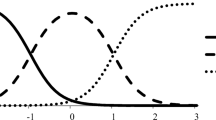Abstract
Many young children appear to have skills sufficient to engage in basic elements of cognitive behaviour therapy (CBT). Previous research has, however, typically used children from non-clinical populations. It is important to assess children with mental health problems on cognitive skills relevant to CBT and to compare their performance to children who are not identified as having mental health difficulties. In this study 193 6 and 7 year old children were assessed using a thought–feeling–behaviour discrimination task [Quakley et al. Behav. Res. Therapy 42 (2004) 343] and a brief IQ test (the WASI). Children were assigned to groups (at risk, borderline, low risk) according to ratings of their mental health made by their teachers and parents on the Strengths and Difficulties Questionnaire [Goodman, J. Am. Acad. Child Adolescent Psych. 40 (2001) 1337]. After controlling for IQ, children ‘at risk’ of mental health problems performed significantly less well than children with a ‘low risk’ of mental health problems. Before receiving CBT, children’s meta-cognitive development should be assessed and additional help provided to those with meta-cognitive difficulties.
Similar content being viewed by others
References
Barrett, P. M., Dadds, M. R., & Rapee, R. M. (1996). Family treatment of childhood anxiety: A controlled trial. Journal of Consulting and Clinical Psychology, 64, 333–342
Barrett, P. M., Duffy, A. L., Dadds, M. R., & Rapee, R. M. (2001). Cognitive-behavioural treatment of anxiety disorders in children: Long term (6 year) follow-up. Journal of Consulting and Clinical Psychology, 69, 135–141.
Bennett, D. S., & Gibbons, T. A. (2000). Efficacy of child cognitive-behavioral interventions for antisocial behavior: A meta-analysis. Child & Family Behavior Therapy, 22, 1–15.
Cohen, J. (1987). Statistical power analysis for the behavioural sciences. Hillsdale, NJ: Lawrence Erlbaum.
Denham, S. A., & Kochanoff, A. T. (2002). Parental contributions to preschoolers understanding of emotion. Marriage and Family Review, 34, 311–343.
Denham, S., Caverly, S., Schmidt, M., Blair, K., DeMulder, E., Caal, S., Hamada, H., & Mason, T. (2002). Preschool understanding of emotions: Contributions to classroom anger and aggression. Journal of Child Psychology & Psychiatry, 43, 901–916.
Dodge, K. A., & Pettit, G. S. (2003). A biopsychosocial model of the development of chronic conduct problems in adolescence. Developmental Psychology, 39, 349–371.
Doherr, L., Reynolds, S., Wetherly, J., & Evans, E. H. (2005). Young children’s ability to engage in cognitive therapy tasks: Associations with age and educational experience. Behavioural and Cognitive Psychotherapy, 33, 201–215.
Durlak, J. A., Fuhrman, T., & Lampman, C. (1991). Effectiveness of cognitive-behavior therapy for maladapting children: A meta-analysis. Psychological Bulletin, 110, 204–214
Flavell, J. H., Green, F. L., & Flavell, E. R. (1995). Young children’s knowledge about thinking. Monographs of the society for research in child development, Serial No 243, Vol 60.
Flavell, J. H., Green, F. L., & Flavell, E. R. (2000). Development of children’s awareness of their own thoughts. Journal of Cognition & Development, 1, 97–112.
Falvell, J. H., Flavell, E. R., & Green, F. L. (2001). Development of children’s understanding of connections between thinking and feeling. Psychological Science, 12, 430–432.
Goodman, R. (2001). Psychometric properties of the Strengths and Difficulties Questionnaire (SDQ). Journal of the American Academy of Child and Adolescent Psychiatry, 40, 1337–1345.
Goodman, R., Ford, T., Simmons, H., Gatward, R., & Meltzer, H. (2000). Using the Strengths and Difficulties Questionnaire (SDQ) to screen for child psychiatric disorders in a community sample. British Journal of Psychiatry, 177, 534–539.
Goodman, R., & Scott, S. (1999). Comparing the Strengthss and Difficulties Questionnaire (SDQ) and the Child Behaviour Checklist (CBCL): Is small beautiful? Journal of Abnormal Child Psychology, 27, 17–24.
Grave, J., & Blissett J. (2004). Is cognitive behaviour therapy developmentally appropriate for young children? A critical review of the evidence. Clinical Psychology Review, 24, 399–420.
Hughes, C., Dunn, J, & White, A. (1998). Trick or treat? Uneven understanding of mind and emotion and executive dysfunction in “hard to manage” preschoolers. Journal of Child Psychology, Psychiatry and Allied Disciplines, 37, 981–994.
Kraemer, H. C., & Thiemann, S. (1987). How many subjects? Statistical power analysis in research. London: Sage.
March, J. S. (1995). Cognitive-behavioural psychotherapy for children and adolescents with OCD: A review and recommendations for treatment. Journal of the American Academy of Child and Adolescent Psychiary, 33, 333–341.
Meltzer, H., Gatward, R., Goodman, R., & Ford T. (2003). Mental health of children and adolescents in Great Britain. International Review of Psychiatry, 15, 185–187.
Quakley, S., Coker, S., Palmer, K., & Reynolds, S. (2003). Can children distinguish between thoughts and behaviours? Behavioural and Cognitive Psychotherapy, 31, 159–168.
Quakley, S., Reynolds, S., & Coker S. (2004). Visual cues and age improve children’s abilities to distinguish amongst thoughts, feelings and behaviours. Behaviour Research and Therapy, 42, 343–356.
Ronen, T. (1992). Cognitive therapy with young children. Child Psychotherapy and Human Development, 23, 19–30.
Saklofske, D. H., Caravan, G., & Schwartz, C. (2000). Concurrent validity of the Wechsler Abbreviated Scale of Intelligence (WASI) with a sample of Canadian children. Canadian Journal of School Psychology, 16, 87–94.
Stallard, P. (2002). Cognitive behaviour therapy with children and young people; a selective review of key issues. Behavioural and Cognitive Psychotherapy, 30, 297–309.
Vygotsky, L. S. (1978). Mind in society: The development of higher psychological processes. Cambridge, MA: Harvard University Press.
Wechsler, D. (1999). Wechsler Abbreviated Scale of Intelligence (WASI). London: The Psychological Corporation.
Young, J., & Brown, P. F. (1996). Cognitive behaviour therapy for anxiety: Practical tips for using it with children. Clinical Psychology Forum, 91, 19–21
Author information
Authors and Affiliations
Corresponding author
Rights and permissions
About this article
Cite this article
Reynolds, S., Girling, E., Coker, S. et al. The Effect of Mental Health Problems on Children’s Ability to Discriminate Amongst Thoughts, Feelings and Behaviours. Cogn Ther Res 30, 599–607 (2006). https://doi.org/10.1007/s10608-006-9037-6
Published:
Issue Date:
DOI: https://doi.org/10.1007/s10608-006-9037-6




